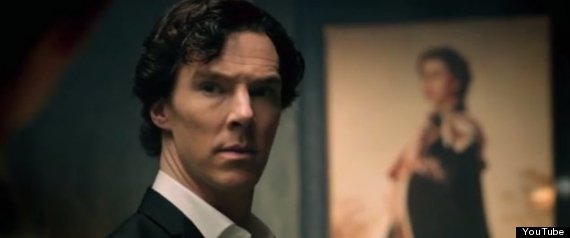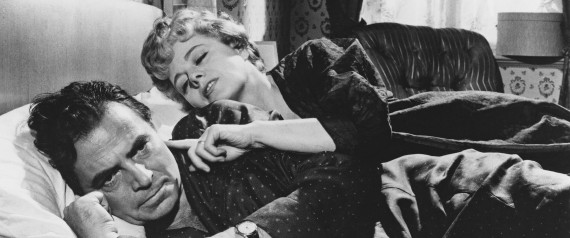
On Valentine's Day, Netflix Nation's love for House of Cards' Frank Underwood was rekindled, and why not? He's ambitious, he's charming, he's Kevin Spacey, and he's... arguably a psychopath. He's conniving and continually reiterates the uselessness of feeling remorse, and yet, for some reason, we want him to succeed.
According to WebMD and the Diagnostic and Statistical Manual of Mental Disorders, as many as 5 percent of the population display psychopathic or sociopathic personality disorders, so it's no wonder a number of popular protagonists do, too. The symptoms, according to Psychology Today, are:
- Egocentric
- Lack of guilt
- Egocentric and grandiose
- Lack of empathy
- Shallow emotions
- Impulsive
- Need for excitement
- Antisocial behavior
The inner lives of psychopaths are mysterious and therefore intriguing; we often ask ourselves of real-life serial killers, "How could someone do such a thing?" Books starring these kinds of antiheros allow us to examine their imagined thoughts from a safe distance. They also allow us to play out any personal fantasies we may harbor about obtaining acclaim or power. But this still doesn't explain why we often find ourselves cheering on, or at least laughing off, Amy from Gone Girl or Patrick Bateman from American Psycho.
The moment we begin rooting for a psychopathic antihero—or at least hoping he doesn't fall flat on his face—can be unsettling. If Frank Underwood had been thrown in jail, or Humbert Humbert's plans to run off with Lolita had been thwarted, we'd likely feel a little cheated, as observers.
There's something appealing about these fictional psychopaths' devotion to a given cause, and the amount of control they're able to maintain in pursuit of their goals. It also doesn't hurt that fictional psychopaths are largely unrealistic. In a study about psychopaths in film, a pair of psychologists determined that, in addition to the typical symptoms, most fictional villains exhibit "high intelligence, a preference for intellectual stimulation (music, fine arts), a stylish and vain demeanor, an always-in-control attitude, and exceptional skills at overpowering and killing people (often with ordinary household objects)—that are not characteristic, particularly in combination, of real psychopaths." They note a few exceptions, including George Harvey in The Lovely Bones, whose double life indicates a false self, a characteristic common among real-life psychopaths.
Fictional psychopaths may be unrealistically likable, but the reason we fall for these shady characters may be even simpler than that: They're able to charm their way to the top, so why wouldn't they charm us, too?
Here are 10 characters from literature who arguably display psychopathic tendencies:

Patrick Bateman from American Psycho
Some characters are hazy to diagnose—their charm muddies our perceptions of their wrongdoings, and they display some semblance of love for others, genuine or not. Patrick Bateman is not one of those characters. He doesn't even attempt to convince the reader that he experiences typical emotions, and instead coolly discusses his serial killings the way you or I would chat about lunch plans. Readers don't root for Bateman per se, but they tend to laugh at his glibness rather than feeling appropriately disturbed by it.
Quote: "...there is an idea of a Patrick Bateman, some kind of abstraction, but there is no real me, only an entity, something illusory, and though I can hide my cold gaze and you can shake my hand and feel flesh gripping yours and maybe you can even sense our lifestyles are probably comparable: I simply am not there."

Sherlock Holmes from The Adventures of Sherlock Holmes
In the BBC adaption Sherlock, Benedict Cumberbatch famously quips, "I'm not a psychopath, I'm a high-functioning sociopath. Do your research." Psychologist Maria Konnikova wrote for i09 that this diagnosis is incorrect; for starters, there's no difference between a sociopath and a psychopath. Further, she claims that Sherlock intentionally suppresses his emotions, rather than simply lacking them. He does express affinity for Watson, but it's arguable that Watson is also a tool that he uses for personal gain. Regardless, he's certainly impulsive and thirsts for adventure. Sherlock is easy to like; he uses his disaffectedness to solve crimes, and is darn good at it.
Quote: "This looks like one of those unwelcome social summonses which call upon a man either to be bored or to lie." -from The Adventure of the Noble Bachelor
Amy from Gone Girl
[SPOILER ALERT] Amy is fixated with maintaining a near-perfect outward appearance, and goes to great lengths to do so. Her parents' children's book series, Amazing Amy, is blatantly based on her, and calls public attention to her triumphs and shortcomings. She regularly alters her persona, and makes and dispenses with friends with ease. She'd literally rather die than be perceived as an ordinary individual who copes with ordinary issues such as adultery and divorce. Yet, as readers, we feel for her. This could be due to Gillian Flynn's clever exposition, setting Amy up as a lovable, naive diarist before revealing her to be a scheming murderer. It could also be thanks to her poignant rant about the myth of the Cool Girl.
Quote:"I was told love should be unconditional. That's the rule, everyone says so. But if love has no boundaries, no limits, no conditions, why should anyone try to do the right thing ever? If I know I am loved no matter what, where is the challenge?"

James Bond from Casino Royale
Notes an LA Review of Books article discussing Bond's psychopathic tendencies, Ian Fleming's Thunderball kicks off with Bond harshly criticizing himself, acting fidgety and destructive, all because he's feeling a little bored. This need for excitement, cited by Psychology Today as a symptom of psychopathy, is characteristic of the Bond from books. He's a classic misogynist, and seems to view potential bedfellows as tasks to complete rather than individuals. But he's suave, handsome, and daring, and so difficult to dislike. Seven positive attributes of well-socialized psychopaths are outlined in a book titled called The Wisdom of Psychopaths; they are ruthlessness, charm, focus, mental toughness, fearlessness, mindfulness and action, and Bond embodies all of them.
Quote:"When she had failed once or twice to respond to some conversational gambit or other, Bond also relapsed into silence and occupied himself with his own gloomy thoughts."

Humbert Humbert from Lolita
Humbert Humbert, needless to say, commits some unforgivable crimes. But he commits them in the name of love! Or so he says, and so we as readers are beguiled into empathizing with him. He uses his purplish language to charm the reader, replacing stark descriptors like "underage girls" with the more criminal-sounding "nymphets," and repeatedly lays the blame on them for his lust. He describes "nymphets" as "demoniac" and "magical," as though he is powerless over his desire for them. Refusing to accept blame for one's own behaviors is textbook psychopathy. But when Humbert dresses up his actions in the language of love, readers are often too caught up in his story to scorn him.
Quote: "You can always count on a murderer for a fancy prose style."

Cersei from A Song of Ice and Fire series
It's arguable that Cersei is capable of love, and therefore couldn't be categorized as a psychopath, but even her love is described as greedy rather than selfless. She's also sexually perverse—if having an affair with your brother can be considered sexually perverse—which is a symptom on the Hare Psychopathy Checklist. Another symptom on the checklist, grandiosity, is characteristic of Cersei. Still, her desperation is understandable; as a woman, she’s often told what her place should be, so she has to work harder than her male counterparts to attain power.
Quote: "She never forgets a slight, real or imagined. She takes caution for cowardice and dissent for defiance. And she is greedy. Greedy for power, for honor, for love." -from A Dance with Dragons

Jay Gatsby from The Great Gatsby
Gatsby, like Cersei or Humbert, is depicted as consumed by "love," but his obsession with Daisy is rooted more firmly in his idea of her, and what she represents, than who she is as a character (and, frankly, she's often portrayed as a vapid, "careless" individual). He constructs a false self, has delusions of grandeur, seems obsessed with how he's perceived publicly, but is actually reclusive and without genuine friendships. Still, Nick thinks he's a great guy, so the reader is inclined to forgive his lying and delusions. Also, he may be manipulative, but he doesn't wish harm upon others, so his potential psychopathy is less threatening or off-putting.
Quote: "There must have been moments even that afternoon when Daisy tumbled short of his dreams—not through her own fault, but because of the colossal vitality of his illusion. It had gone beyond her, beyond everything."
Becky Sharp from Vanity Fair
Like Gatsby, Becky Sharp shows us that not all certifiable psychopathy takes the form of serial killing. Becky is a social climber, and is ruthless about fighting her way to the top. She even uses her more emotional friend Amelia as a vehicle for social success. Becky seems to care about little else aside from marrying someone wealthy, and is willing to exploit the attachments of others in her quest to do so. But, as readers, we're not inclined to view Becky as evil. She's a misfit among the upper echelons of society, and therefore exposes the absurdity of the elite.
Quote: “Revenge may be wicked, but it’s natural.”
Meursault from The Stranger
Meursault's apathy towards his mother's death is meant to illustrate the triumph of the individual over societal expectations. But it's still chilling that he can't recall the day on which his mother died. It's especially disconcerting when he kills a man in cold blood, citing the heat as an excuse, and later explaining, "My nature was such that my physical needs often got in the way of my feelings." He's also repeatedly asked to demonstrate or verbally admit to having feelings for the woman he's seeing, and refuses to. Still, we empathize with him, because, Existentialism!
Quote: "Mother died today. Or maybe yesterday; I can't be sure."

Dean Moriarty from On the Road
Dean preaches living in the moment, and sometimes takes this philosophy a bit further than your everyday beatnik might. He's a womanizer, as he leaves his wife and the mother of two of his children behind to travel across the country with a 16-year-old girl, being sure to form connections that are exciting but that have no sense of permanence. Needless to say, Dean seems to require a good deal of action to feel satisfied. Whether his escapades can be chalked up to plain ol' youthful recklessness is hard to say, but regardless, he's easy to like, as he embodies spontaneity to the fullest.
Quote: “I was surprised, as always, by how easy the act of leaving was, and how good it felt."
